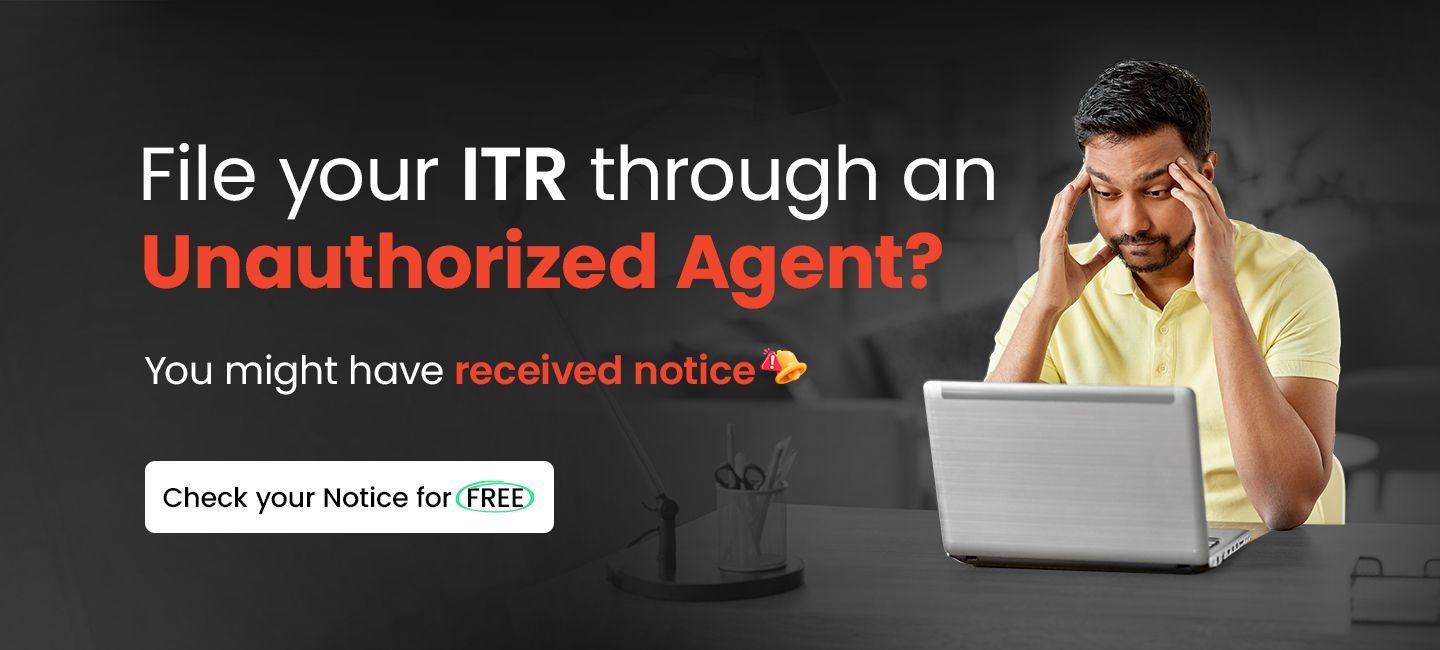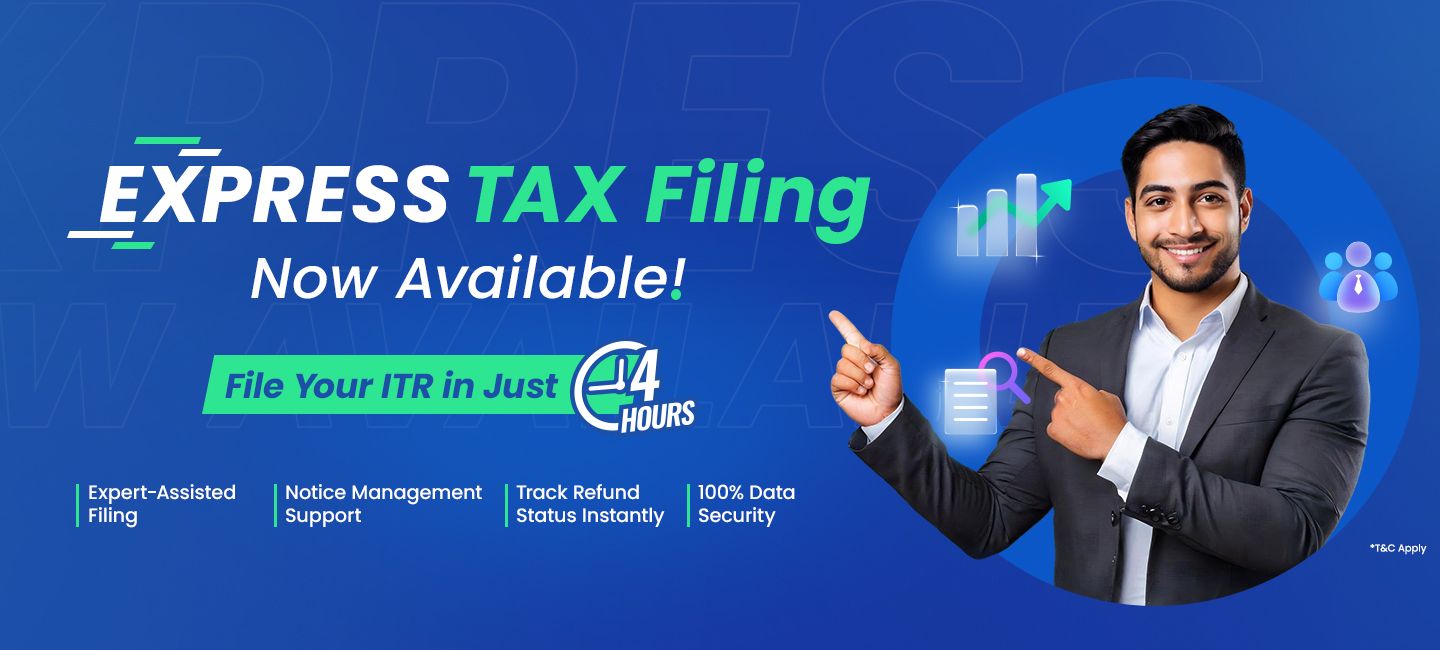Our Services


Value Added Services
Know your Refund
Notice Management
Group Booking
Tax Consultancy
Popular Tools & Calculators
HRA Calculator
How can I save money on tax?
Old vs New Regime Selection
Step into your preference, old vs new regime!
Help me Select a Plan
Unsure? Select the right tax filing plan based on your income.

Help me Select a Plan
Unsure? Select the right tax filing plan based on your income.
HRA Calculator
Calculate your eligible House Rent Allowance (HRA) online.
Old vs New Regime Selection
Compare both tax regimes and choose the best option for you.
Tax Slabs
Old Regime
New Regime
Numbers from last Tax Season
350%
Increase in tax filings compared to last season
₹ 70 Cr+
Worth taxes saved by our customers
₹ 6.5 Cr+
Saved in tax filing fees by choosing us over local agents
81%
Filing completed within 12 hrs of request received
73%
Customers trusted us again from last year
4.8/5.0
Average customer satisfaction rating

350%
Increase in tax filings compared to last season
₹ 70 Cr+
Worth taxes saved by our customers
₹ 6.5 Cr+
Saved in tax filing fees by choosing us over local agents
81%
Filing completed within 12 hrs of request received
73%
Customers trusted us again from last year
4.8/5.0
Average customer satisfaction rating

Why Choose Us


FAQs
Filing an Income Tax return is crucial as it:
- To avail all types of loans including home loan and Education loan
- Ensures excess tax refunds
- Required for Visa applications
- Aids in Financial planning
- It is a legal obligation
You can file your income tax returns online, either on the income tax department's website or you can file your returns through any ERI registered platform or agency. udChalo is an ERI authorized platform by government of India
An e-Return Intermediary (ERI) is an authorized entity that helps taxpayers file their income tax returns electronically through the E-filing 2.0 portal. Under the Electronic Furnishing of Return of Income Scheme, 2007, ERIs are registered intermediaries who assist taxpayers by simplifying the filing process and providing additional facilitation services.
As per section 139(1) of the Income Tax Act, 1961 in the country, individuals whose total income during the previous year exceeds the maximum amount not chargeable to tax, should file their income tax returns (ITR).
- Individuals who only have Salary income
- Individuals who have switched jobs (Multiple Form 16)
- Individuals having Income from Capital Gains (mutual funds & stocks), business/profession, House Property, other income such as Interest etc.
- Individuals having Foreign Income (Onsite deputation), Foreign Assets, NRI
- PAN (Permanent Account Number): Your identity proof for all things tax.
- Aadhaar Card: Needed for linking with your PAN and for verification.
- Bank Account Details: To process any refunds you might get.
- Form 26AS: Shows the tax that's been deducted from your income and paid to the government on your behalf. It helps you know how much tax you've already paid.
- TDS Certificates: If tax was deducted from your income, like from your salary or interest earnings, you'd get these certificates. They're also known as Form 16 (for salary) and Form 16A (for other incomes).
- Income Proof: This could be salary slips, interest certificates from banks, or income statements if you're self-employed.
- Deductions and Exemptions Proof: Documents showing investments or expenses that can reduce your taxable income, like insurance, educational loans, or house rent.
Gathering these documents before you start your ITR filing can save you time and help avoid errors.
If you are a salaried individual, it is your employer’s responsibility to provide you with a Form 16, if they have been deducting taxes from the source
Yes. Though the presence of Form 16 makes the tax return filing process way easier, you can still file your returns without Form 16.
Though, your employer must provide you with a Form 16 if TDS is collected, paying taxes if completely your responsibility. If you earn more than the threshold of INR 2,50,000 you are eligible to pay taxes. You must check your tax liability and pay them accordingly.
No, you cannot e-file without Aadhaar card. If you don't have an Aadhaar card, please apply for one and quote the Aadhaar enrollment number.
If a taxpayer fails to file their Income Tax Return (ITR) by the due date, they may be liable to pay penalties and interest. The penalties for non-filing or late filing of ITR in India are as follows:
Late filing fee: If a taxpayer fails to file their ITR by the due date, they may be liable to pay a late filing fee of up to Rs. 10,000, depending on the delay in filing. The late filing fee for belated ITR, i.e., ITR filed after the due date but before December 31st of the relevant assessment year, is Rs. 5,000. For returns filed after December 31st, the late filing fee increases to Rs. 10,000.
Interest on tax liability: If a taxpayer has any outstanding tax liability, interest will be charged on the amount due from the due date of filing until the date of payment. The interest rate is currently 1% per month, calculated from the due date of filing until the date of payment.
Loss of certain benefits: If a taxpayer files a belated return, they may lose certain benefits, such as the right to carry forward losses, etc. And in case of failure to file ITR at all, they will not be able to claim TDS refunds, if any.
Prosecution: In case of a willful failure to file ITR, the taxpayer may be subject to prosecution under Section 276CC of the Income Tax Act, which can result in imprisonment and/or fine.
Fortunately, there are several ways to save tax in India. You can claim tax deductions, invest in tax-saving instruments, and get legitimate credits. An authorized tax planner can help you use these methods to get the lowest tax bills.
Yes! You need to visit at udChalo Portal and select CA-Assisted tax filing plan, and select plan based on your Income categories. A tax expert will assign to you and prepare your tax return and file it for you.
Uploading ITR alone does not complete the return filing process. Verification of return is important to complete the return filing process.
Yes, you can still verify your returns online. However, you will need to submit a ‘condonation request’ for condonation of delay, providing a valid reason for the delay. The verification of your return will only be considered complete after the Income Tax Department approves the condonation request.
Though, your employer must provide you with a Form 16 if TDS is collected, paying taxes if completely your responsibility. If you earn more than the threshold of INR 2,50,000 you are eligible to pay taxes. You must check your tax liability and pay them accordingly.
If your ITR V receipt status shows as ITR-V Rejected, then in such case, click on the Acknowledgement Number & the reason for ITR V rejection will be shown. ITR V can be rejected for various reasons, such as you may have sent a return for verification after 30 days, or ITR V was folded or stapled, etc. Make sure you correct the mistake & resend ITR V (other than cases where the 30-day limit has been exceeded).
Beyond Section 80C, there are several avenues for tax savings. You can consider:
- Claiming tax-deductible expenses such as insurance premiums, tuition fees for children, rent payments, home loan/stamp duty payments, interest on home loans, and medical expenses for dependent family members.
- Exploring investment options like the National Pension Scheme (NPS) to optimize your income structure and minimize taxable income.
Diversifying your tax-saving investments across various asset classes and leveraging a mix of deductions and exemptions is key to comprehensive tax planning.
If you are salaried and receive HRA from your employer, you cannot claim this deduction. Submit the rent receipts to your employer and this will be included in your Form 16.
If you are salaried and do not receive HRA as part of your salary, then you can claim deduction under section 80GG for rent.
Every individual or HUF can claim a deduction from their total income under section 80D for medical insurance premium paid in any given year.
The deduction benefit is available not only for a health insurance plan for self but one can also take the advantage of buying the policy to cover spouse, or your dependent children or parent.
It is over and above the deductions claimed under section 80C.The amount of deduction allowed under section 80D prior to Budget 2015-16 was Rs 15,000 which was then increased to Rs 25,000. In case of senior citizens , the deduction limit was increased from Rs 30,000 to Rs. 50,000.
Yes, if you have exhausted the Section 80C limit of Rs 1,50,000, then consider investing in NPS. Deduction for self-contribution to NPS - section 80CCD (1b) has been introduced for an additional deduction of up to Rs 50,000 for the amount deposited by a taxpayer to their NPS account.
Yes, the upper limit is set at INR 1,50,000 for a fiscal year. Though you can invest more than the limit, you can only claim deductions up to the prescribed limit.
Yes, but both bank accounts should have the status Validated.
Only a pre-validated bank account can be nominated to receive Income Tax refund.
Further, a pre-validated bank account may also be used by the individual taxpayer for enabling EVC (electronic verification code) for e-Verification purpose. e-Verification can be used for Income Tax Returns and other Forms, e-Proceedings, Refund Reissue, Reset Password and secured login to e-Filing account.
No. You can only pre-validate the following accounts for refund:
Saving Bank Accounts,
Current Accounts,
Cash Credit Accounts,
Over Draft Account,
NRO Account.
If you try pre-validating any other account type, the bank validation will fail, and the system will display an Invalid Account error.
The pre-validation process is automatic. Once your request is submitted, it is sent to your bank. The validation status is updated in your e-Filing account within 10 - 12 working days.
In such a case, you will see a ! warning symbol next to your mismatched contact details (mobile number / email ID) in your Added Bank Accounts section. If you wish to EVC-enable that bank account, you will need to update your contact details on the e-Filing portal to match your details registered with the bank or update the mobile/email at bank’s end same as your e-filing registered primary mobile/email. Once details are updated, revalidate your bank account.
The Income Tax Department issues notices for non-compliance with tax laws. This could include errors in filing the original return, non-payment or short payment of taxes, or non-filing/late filing of returns. The udChalo Income Tax Notice Management Plan is designed specifically for Armed Forces personnel to help them understand notices issued under Sections 139(9) and 143(1) and provide expert assistance to respond effectively.
A dedicated tax expert with extensive knowledge of tax notice resolutions will guide you through the entire process, ensuring a smooth and stress-free experience.
Plan Details
- Notices Covered: Sections 139(9) and 143(1).
- Advisory Services: Get professional advice on how to respond to the notice received.
- Revised Return Filing: If applicable, our experts will assist with filing revised returns to address the issues highlighted in the notice.
- Dedicated Support: A Tax Expert will be assigned to you, ensuring personalized and timely assistance throughout the service period.
The OTP Fraud Protection Plan is a security solution introduced by udChalo to safeguard our customers against financial losses due to OTP fraud while transacting with us. We ensure peace of mind by providing financial compensation under specific terms and conditions in the unlikely event of OTP fraud occurring during the ITR filing process.
- Coverage starts immediately after purchase and remains active for the specific transaction/session.
- Maximum refund coverage per incident: ₹ 15,000/-
- Applicable only for transactions conducted directly through udChalo’s platform or authorized representatives.







